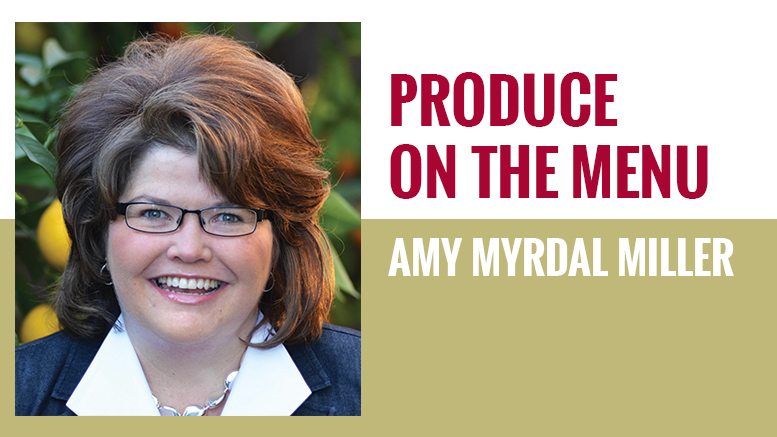What Foodservice Needs Now: Innovation in Produce Processing and Packaging
July 30, 2020 | 4 min to read
Foodservice leaders are prioritizing sanitation and packaging in response to consumer health concerns. Maeve Webster emphasizes that suppliers must offer solutions to build trust. Staffing challenges complicate operations, especially in school nutrition programs, which require pre-packaged food options for safe meal distribution. Experts like Dayle Hayes and Cathy Powers highlight the need for more diverse and engaging fruit and vegetable offerings, advocating for innovation despite labor constraints. Lisa Feldman calls for creative and interactive produce solutions to enhance student experiences.

Originally printed in the July 2020 issue of Produce Business.
Foodservice leaders across all channels are wildly obsessed with two issues today: sanitation and packaging. Consumer concerns about their health and safety when buying food prepared away from home are prompting everyone in the industry to evaluate what they can do to demonstrate overt sanitation measures and reassure customers that the food they are about to enjoy is safe.
“Meeting expectations consistently with safety and sanitation is critical to rebuilding trust,” asserts Maeve Webster, president of Menu Matters. Webster goes on to say, “Given the immense challenges of operating in this new environment, any supplier who wants to secure a long-term relationship with a customer will provide solutions, not just products.” How can the produce industry provide more solutions?
As foodservice operations are opening under new restrictions, including limited seating capacity, many are also facing staffing challenges. Many minimum wage workers are now earning more on unemployment; some may wait to return to work until unemployment benefits run out. Suppliers who can provide value-added products that reduce labor costs and pressures, including pre-packaged options that do not require labor for preparation, may see additional sales opportunities in this new environment.
As stay-at-home orders were enacted around the country, no sector of the foodservice industry was forced to shift operations faster than school nutrition programs. They were moving students through cafeteria lines one week, and the next week distributing meals for students and their families via school buses. As schools start to reopen, school nutrition leaders will need options for serving pre-packaged food wherever the student may be eating lunch (e.g., classroom, socially distanced cafeteria, outdoors, etc.).
Suppliers who can provide value-added products that reduce labor costs and pressures, including pre-packaged options that do not require labor for preparation, may see additional sales opportunities in this new environment.
“Students and school nutrition leaders alike want more options than just baby carrots and sliced apples,” says Dayle Hayes, founder of School Meals That Rock and a Produce for Better Health Foundation Fruit and Vegetable Ambassador in Action. “There is a big opportunity for the produce industry to introduce kids to a greater variety of fruits and vegetables if products can be packaged and ready for distribution to students with no labor needed for prep.”
Labor is a critical issue for everyone in the restaurant industry, but this is particularly true for school nutrition programs. “Our nation’s schools serve twice as many meals per labor hour as fast food operations,” says Cathy Powers, Co-Chair of The Culinary Institute of America (CIA) Healthy Kids Collaborative, a membership-based initiative dedicated to exploring culinary solutions to increase the availability and acceptance of healthy foods in schools. “Schools have never had the labor to process produce efficiently. The labor challenges with serving fresh fruits and vegetables are even greater now that all food must be individually wrapped.” Powers says she hopes companies will offer schools local processing of fruits and vegetables. “Schools love to support Farm to School programs, but they need produce processing support given all the labor challenges.”
Lisa Feldman, director of recipe management for Sodexo and Co-Chair of the CIA Healthy Kids Collaborative, looks at these issues through the eyes of a chef. “Sure, we can offer whole fruit, but if we want kids to get excited about the fruits and vegetables we’re offering, we need to do more,” says Feldman. “I’m interested in how produce companies can help us provide options that are more interesting, delicious, interactive, and customizable.”
Feldman goes on to ask, “Can a pre-cut, pre-packaged jicama supplier include Tajín packets (a seasoning blend of ground chile peppers, sea salt, and dehydrated lime juice) so kids can season the jicama to their liking? Can we get produce ‘spoons’ for legume-based dips like hummus so kids can eat the cutlery versus filling up landfills with plastic spoons? Can we get new produce-based dips with pre-cut fruits and vegetables?”
Feldman made this final statement with great conviction. “Just because we have to serve everything in individually wrapped packages doesn’t mean we have to lose our focus on innovation and flavor. If we want kids to eat more fruits and vegetables, we have to do more with produce to create experiences kids will love.”

Amy Myrdal Miller, MS, RDN, FAND is a farmer’s daughter from North Dakota, award-winning dietitian, culinary nutrition expert and founder and president of Farmer’s Daughter Consulting, Inc. She is the director of The Culinary Institute of America Healthy Menus R&D Collaborative and a consultant for the Produce for Better Health Foundation. You can learn more about her business at www.farmersdaughterconsulting.com, and you can follow her insights on food and flavor on social media @AmyMyrdalMiller
2 of 18 article in Produce Business July 2020

